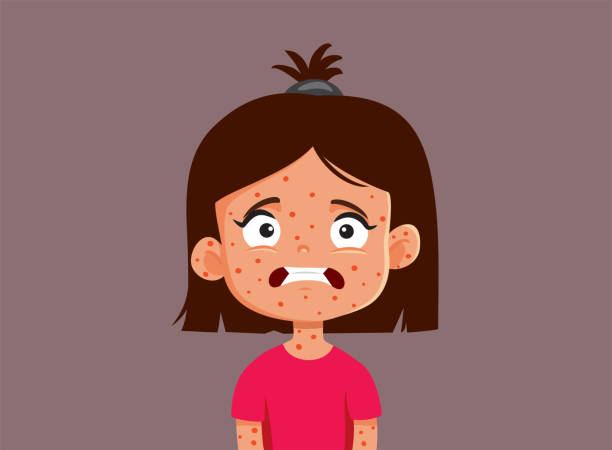1. What is Rubeola? Rubeola, commonly known as measles, is a highly contagious viral infection caused by the measles virus. It is characterized by a distinctive red rash, high fever, and other flu-like symptoms.
2. Types of Rubeola: There is only one type of measles virus that causes the infection.
3. Symptoms of Rubeola:
- Rash: A red or reddish-brown rash that typically starts on the face and spreads to the rest of the body.
- Fever: High fever, often exceeding 101°F (38.3°C).
- Cough: Dry cough is a common symptom of measles.
- Conjunctivitis: Red, watery eyes may occur.
- Other symptoms: Runny nose, sore throat, and muscle aches are also common.
4. Causes of Rubeola: Rubeola is caused by the measles virus, which is highly contagious and spreads through respiratory droplets when an infected person coughs or sneezes. It can also spread through direct contact with nasal or throat secretions of an infected individual.
5. Risk Factors for Rubeola:
- Lack of vaccination: Individuals who have not been vaccinated against measles are at higher risk of infection.
- Travel: Traveling to areas where measles is endemic increases the risk of exposure.
- Compromised immune system: People with weakened immune systems are more susceptible to severe complications from measles.
6. Diagnosis of Rubeola: Rubeola is typically diagnosed based on clinical symptoms and a history of exposure to the virus. Laboratory tests, such as blood tests or throat swabs, can confirm the presence of the measles virus or antibodies against it.
7. Pharmacokinetics of Rubeola:
- Entry: The measles virus enters the body through the respiratory tract.
- Replication: The virus replicates in the respiratory epithelium and spreads through the bloodstream to other organs.
- Clearance: The immune system clears the virus from the body, typically within a few weeks.
8. Pharmacodynamics of Rubeola:
- Immune response: The body’s immune system responds to the measles virus by producing antibodies to neutralize the virus and eliminate infected cells.
- Inflammation: Inflammation caused by the immune response contributes to the symptoms of measles, such as fever and rash.
9. Pharmacological Treatment of Rubeola:
- There is no specific antiviral medication for measles.
- Treatment focuses on relieving symptoms, such as fever and discomfort, with over-the-counter pain relievers and antipyretics.
10. Non-Pharmacological Treatment of Rubeola:
- Rest: Getting plenty of rest helps the body recover from the infection.
- Hydration: Drinking fluids helps prevent dehydration, especially if fever is present.
- Isolation: Infected individuals should avoid close contact with others, especially those who are unvaccinated or have compromised immune systems, until they are no longer contagious.
11. Conclusion: Rubeola, or measles, is a highly contagious viral infection that can cause serious complications, especially in young children and immunocompromised individuals. Vaccination is the most effective way to prevent measles and its complications, highlighting the importance of vaccination programs in public health efforts.




